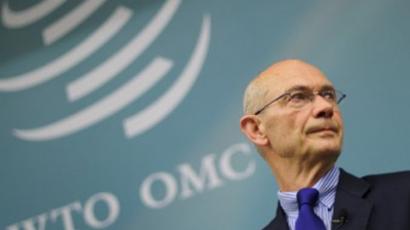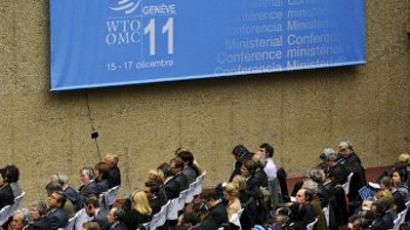Russia’s accession to WTO – ‘a fair deal’?
WTO membership will seriously hit a number of uncompetitive industries in Russia, such as agriculture and automobiles, as well as light industry and machine manufacturing. But EU trade commissioner, Karel de Gucht, has told RT it was a fair deal.
“These were, I believe, fair negotiations,” he said. “I think it is a fair deal. And once you have concluded a deal, you should stop discussing the content of the deal.”De Gucht does not agree with the widespread opinion that Russia made too many concessions to get that seat in the WTO. “You have to negotiate with your own interest in mind, but also having in mind that the other party also needs to find its own interest in the negotiation,” he said.The concessions made today in the agriculture and automotive sectors will benefit the modernization of the industries in the long term, he believes.“There is a completely new set of rules with respect to sanitary norms for foods,” he said. “It is also very important what we have concluded with respect to the automotive sector, where Russia had been taking unilateral measures. And now we have come to a compromise on these.”“I believe that this agreement we have made will result in a modern automotive industry,” he added.Russia’s local energy market will also suffer as energy prices in Russia are currently much lower than in the EU, and that imbalance must be resolved under the agreement. “[Russia] will have to go to market prices over time,” he admitted. “Once you are a member of the WTO, you have to go to market prices and you cannot have the double-pricing.”An advantage Karel de Gucht does see for Russia is that it will be easier to attract more foreign capital into the economy: “[Russia’s] accession to the WTO will give [investors] assurance that they are working in a legal environment that is more transparent than it was before.”He expects Russia’s trade turnover with the EU to rise “considerably,” but not necessarily by the amazing 300 per cent China showed after becoming a member of the WTO.“Russia’s economy is focused on a much more limited number of sectors,” De Gucht said. “I think it will depend on Russia which direction they take. And if Russians take the direction of modernizing their economy, of being involved also in new sectors, then probably the agreement to get into the WTO will be more fruitful to them – but that is up to them.”














